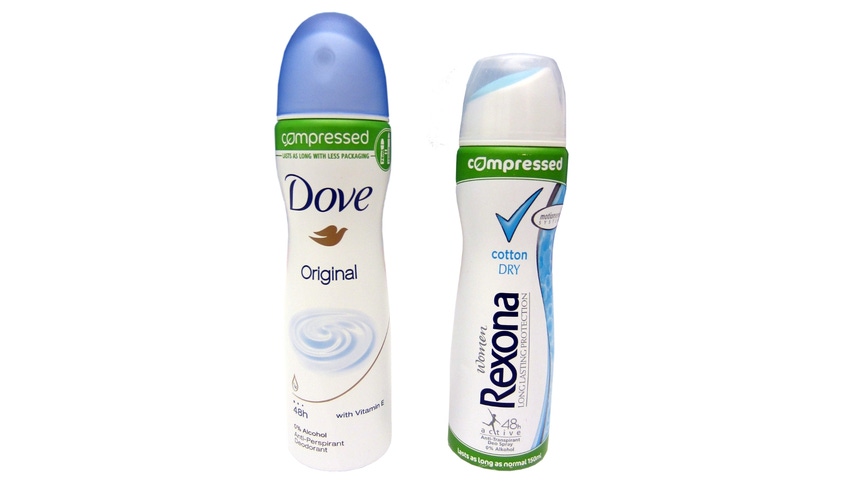Tackling the toughest issues

Winners in the 2014 DuPont Awards competition display technological savvy, environmental responsibility and attention to the consumer experience.
This year’s DuPont Awards for Packaging Innovation competition, the 26th annual, shines a spotlight on the cleverest, greenest and most consumer-friendly packages from around the world.
A total of 16 packages were honored in the 2014 competition, with Unilever earning the Diamond Award for its Compressed deodorant cans. Five other packages, for products ranging from pasta dough to cleaning products, received Gold Awards. An additional 10 packages were awarded Silver.
The judging criteria were changed this year to better reflect industry drivers and trends. The three judging categories were: Responsible Packaging, Technological Advancement and Enhanced User Experience. Silver winners demonstrated excellence in any one of these categories. The gold winners hit two out of the three, and the Diamond winner excelled in all three.
An international panel of judges examined almost 200 entries from 31 countries to select the winning packages.
Here are the winners of the Diamond and Gold Awards.
Diamond: Compressed deodorants fit the same amount of product in much smaller cans
Won for Technological Advancement, Responsible Packaging and Enhanced User Experience
Unilever (United Kingdom) took top honors this year with its Compressed deodorant packaging, which delivers environmental, consumer and retailer benefits.
The company uses the cans for several aerosol-deodorant brands, including Dove, Rexona/Sure, Vaseline and Lynx/Axe. The new 75-milliliter Compressed cans contain the same amount of deodorant protection as the conventional 150ml cans, but the new cans use considerably less packaging and require less gas to deliver the deodorant.
On average, the Compressed packages require 25 percent less aluminum and 50 percent less gas for each can. Because the cans are smaller, 53 percent more cases fit on each pallet, which provides shipping and storage efficiencies.
Retailers can fit up to 45 percent more cans on the shelf, and consumers benefit because the smaller cans are more portable and therefore better suited to on-to-go use and travel.
“The biggest packaging challenge was to re-engineer the spray system so that the new Compressed products could deliver to their promise to last as long as the big cans and to provide consumers with their best-ever aerosol-deodorant experience,” says Sebastian Alvarez, R&D global technical project leader at Unilever.
He adds: “Working in partnership with our valve and [actuator] suppliers and with our internal formulation experts, we managed to design a spray system with the right characteristics … to get the right spray performance from the start to end of the life of each pack.”
Unilever worked with Lindal Group to develop the valve for the new package and with Epoch Design Ltd. to create the graphics.
Gold: Squeezable carton-pouch makes fresh pasta quick and easy
Won for Technological Advancement and Enhanced User Experience
A creative and practical retail package for Frizle brand organic, raw spätzle doughgives consumers an easy, fast, mess-free way to make fresh pasta at home. VerDeSoft (Germany) designed the package and developed equipment to erect, fill and close it.
The Frizle carton-pouch is rectangular with an almond-shaped bottom panel that features a series of holes covered with a seal. The consumer removes the seal and squeezes the package, over a pot of boiling water, to dispense the semi-fluid dough through the holes.
Sold as a refrigerated product, the pasta cooks in three minutes. The package is designed for a single use and holds 380 grams of dough. ALB-GOLD Teigwaren GmbH (Germany) supplies the dough.
Martin Spiegel Kartonagenfabrik GmbH & Co. KG (Germany) is the converter of the packaging material, which consists of paperboard with an inner coating of polyolefin. The coating provides barrier properties and is compatible with ultrasonic sealing. Strong seals are necessary because of the amount of pressure the squeezable package is subjected to at the time of use.
Frizle brand pasta is sold in Germany at Edeka and REWE supermarkets and other stores.
Gold: Smart dosing cap reduces cleaning-product waste
Won for Technological Advancement and Enhanced User Experience
The smart dosing, auto-stop cap from Procter & Gamble solves the housekeeping problem of dispensing too much cleaning product, especially concentrates. Created for P&G’s highly concentrated liquid cleaners, the cap is the “smallest dosing system in market,” according to the company. By improving dose control, the cap reduces consumers’ product waste.
Designed for ease of use, the cap uses a timer mechanism to deliver exactly one dose of cleaner per squeeze. When the consumer inverts the PET bottle and squeezes it, the cap dispenses a dose of product and a piston moves forward to stop the flow of product. The cap includes an easy-open flip top and drip-free spout, and it’s compatible with various bottle sizes.
P&G uses the smart dosing cap for Mr. Clean, Mr. Propre and Flash concentrated cleaners in several European countries, including the United Kingdom, and also in the United States and Canada. Each pre-measured dose equals five to 50 milliliters, depending on the product, with high accuracy and reproducibility throughout the life of the product.
The cap consists of just four parts. Unlike many other dosing pumps and systems, the smart dosing cap is recyclable because all the parts are made of polypropylene.Its simple design also makes it a low-cost component to manufacture.
P&G groups from Belgium, Singapore, Switzerland and the U.S. participated in the smart dosing cap project.
Gold: Printing technique enables variable information without extra labels
Won for Technological Advancement and Responsible Packaging
A printing technology from Plastipak Packaging Inc. (USA) called Direct Object Printing provides environmental benefits—primarily, reduced label waste. The technique makes it possible to print directly on rigid packages, as Plastipak did with the Tide Plus Bleach Alternative Liquid Laundry DetergentbottlefromP&G.
The plastic Tide bottle is printed on the shoulder with an “HE” emblem to signify the detergent’s compatibility with high-efficiency washers.
Additional applications for Direct Object Printing include limited-time information, such as promotional messages, coupons or quick-response (QR) codes. It also can be used for full-panel printing on the front, side or back of a bottle.
The technology is “all digital, drop-on-demand, single-pass inkjet, with variable-print capability,” says Ron Uptergrove, director of advanced manufacturing at Plastipak. The print designs and/or text can be changed within seconds, enabling fast time to market and runs of bottles with a variety of promotional messages.
Uptergrove says Plastipak has “focused on developing print capability on many [package] shapes,” including ovals, squares and round packages. The technique can be used to print embossed surfaces, as well.
A key benefit of the technology is reduced use of labels, which stems waste, simplifies package recycling, streamlines the packaging supply chain and reduces carbon footprint. Further, the UV inks used in Direct Object Printing are eco-friendly; they contain no volatile organic compounds (VOCs).
Gold: Tear-apart pouch holds two cooking sauces
Won for Technological Advancement and Enhanced User Experience
Nestlé Australia Ltd. focused on convenience and ease of use with its dual-compartment stand-up pouch for Maggi Stir Fry Creations. Consumers can cleanly separate the two compartments by tearing along an easy-open perforated line that runs up the center of the package. Amcor Flexibles (China and Singapore) prints, converts and pre-makes the pouch. Nestlé also worked with Landor (Australia) on the package design.
The product, which comes in several flavors, was created to help consumers make authentic-tasting Asian food at home. One of the pouch’s compartments holds an Infusion Paste and the other contains Finishing Sauce.
The home cook first mixes meat or chicken with the Infusion Paste, then stir-fries the protein and finally adds vegetables to the pan. When the vegetables are cooked, the Finishing Sauce is stirred in to complete the dish.
Double gussets in the bottom of the pouch—one at the base of each compartment—enable the package to stand up before and after it’s torn in two. The package’s total fill weight is 150 grams.
Gold: UHT milk pouch provides months of shelf life
Won for Responsible Packaging and Enhanced User Experience
A pillow pouch that’s aseptically filled with UHT (ultra-high temperature) processed milk is making shelf-stable liquid milk more widely available in India. The package, which provides 90 days of shelf life before it’s opened, offers a low-cost alternative to conventional aseptic packaging.
The project is a strategic partnership of three companies: Parakh Agro Industries Ltd. (India), under managing director Prakash Parakh; Elecster (Finland), under director Hannu Asunmaa; and ISF Industries (India), under managing director Siva Sivakumaran.Parakh Agro supplies the film for the pouches, Elecster supplies the sterilizing and aseptic UHT pouch filling equipment, and ISF Industries provides sales and service for the film lines.
The pouch film was “jointly developed by Parakh Agro and Elecster to suit Indian environmental conditions,” says Vinay Nalawade, director of packaging at Parakh Agro.The 5-layer, EVOH-based film used to make the pouches incorporates a tie layer of DuPont Bynel 4109 resin.
For dairies, the pouches offer a smaller carbon footprint than non-shelf-stable packages, plus lower costs for storage and distribution because refrigeration is not required. Dairies also benefit from a significantly lower packaging-materials cost for UHT pouched milk vs conventional aseptic packages—savings that could be passed on to consumers.
The shelf-stable pouches are a practical choice for consumers without refrigerators. And because the pouches are aseptically filled with sterilized milk, consumers enjoy ready-to-drink convenience; they do not need to boil the milk before drinking it.
The pouched UHT milk is sold under the Amul brand name insizes ranging from 100 milliliters to 1 liter.
Kate Bertrand Connolly is a seasoned freelance writer based in the San Francisco area covering the packaging, food and technology markets. You can contact her at [email protected].
Silver Winners
Read descriptions of the Silver Award winning packages at pdlinks.com/DuPontSilver2014.
Closed-loop recycling turns old PET water-cooler bottles into new
Ice River Springs Water Co. (USA)
Won for Responsible Packaging
Beeswax honey pots protect product, reduce waste
Betamiel (Morocco)
Won for Responsible Packaging
Retort pouch offers Brazilian restaurants an alternative to cans
Bemis (Brazil)
Won for Enhanced User Experience
Infini HDPE bottle minimizes weight without sacrificing performance
Nampak Plastics (United Kingdom)
Won for Responsible Packaging
Sandwich pouch uses ‘steam dome’ to control microwave heating
Curwood, Hillshire Brands (USA, all)
Won for Technological Advancement
Flexible box offers benefits of rigid packaging with less waste
Clear Lam Packaging Inc., John B. Sanfilippo and Son Inc., Spear Systems (USA, all)
Won for Responsible Packaging
Chicken bag provides roast-in convenience and boosts food safety
FFP Packaging Solutions Ltd., Faccenda, ASDA, Ulma Packaging (United Kingdom, all)
Won for Enhanced User Experience
Audible click signals secure reclosing of sliced-ham package
Sigma Alimentos, Multivac, Winpak (Mexico, all)
Won for Enhanced User Experience
Foil-free soup packet reduces carbon footprint while maintaining shelf life
Mondi, Mondi Coatings GmbH, Mondi Coating Zeltweg GmbH (Austria, all); Afripack Group (South Africa)
Won for Responsible Packaging
Gatorade bottle loses weight but gains strength
Pepsico, Stress Engineering, Tether (USA, all)
Won for Responsible Packaging
About the Author(s)
You May Also Like




